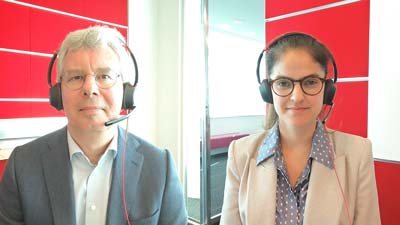Johanna Englundh: Morningstar has initiated coverage of Sweden's largest defence contractor, Saab. And I've got Morningstar's equity analyst, Loredana, here with me today to hear more about her thoughts on the stock, what made her allocate a wide moat rating, and what investors should look out for in the future.
Thank you for joining us today, Loredana. Let's start with a fair value estimate. You've set a fair value estimate on Saab stock at 860 Swedish kronor. What lies behind this valuation?
Loredana Muharremi: Hi, Johanna. Our fair value of SEK860 is backed by higher defence spending, as well as margin expansion due to a shift in product mix towards the dynamics and surveillance system, which have higher margin and are more cash generative. Moreover, we have the majority of the programs that are shifting from development phase to production phase. So, Saab derives the majority of its revenues in Europe. We see many opportunities here, starting with, of course, Sweden. In Sweden, Saab is the biggest defense contractor, and the country has pledged around SEK300 billion for defence spending between 2023 and 2025. And we expect Saab to be able to capture around 60% of it.
Moreover, the company is an international leader in anti-tank weapons, in radars, in electronic warfare. So, we think it is very strongly positioned to gain from the raise in demand due to the Russia-Ukraine war. And this is not only a short-term gain. We see it as also a long-term opportunity, as European countries will have to replenish their stocks on this platform thereafter. Moreover, Germany is another very important opportunity. In Europe, Germany is said to become the third largest defence spender globally in 2025. And Saab is very strong there in electronic warfare and surveillance for the Navy. But also currently, it has received the role to upgrade the electronic warfare system for Germany's Eurofighter aircrafts. Finally, if we move outside of Europe and we look at U.S., Saab is starting the delivery of the T-7A, which is a training fighter jet that it's developing with Boeing. So, there are exciting opportunities. And these are the main reasons that are backing our SEK860 fair value.
Englundh: Okay. And you've also allocated Saab Morningstar's highest moat rating. What made you give Saab a wide moat?
Muharremi: Yeah, when we consider the moat for Saab, and we assign the wide moat, we consider the technological requirements, the switching cost and the regulatory barriers that are present in defense. Saab derives 95% of its revenue in defense. And while competition for a bid among incumbent players is very intense, once a company wins a successful military program, then it guarantees a long stream of revenue with high switching costs. The switching costs are so high because of the contract in defense. Defense contract usually starts as cost plus contracts in which the military assumes the risk of any cost overruns during the initial phase of the program and only shifts into fixed price contracts once the platform goes into production, so once the risk of the platform is lower. So, switching costs for the military are, given the capital that they've invested, the time that they've invested, very high to move to another contractor once the program is up and running.
Moreover, if we look at Saab's record high backlog of SEK126 billion, that only provides us with a glimpse of Saab's future potential. And that's because the majority of the platform that we have there have long development phase cycles, long production cycles and high after market opportunities. Development cycles, they go from two years to multi-decades. And we believe that platforms with longer development cycle like fighter jets, submarines, they weren't a stronger moat because of higher switching costs. So, it's easier for the military to work with a current contractor in solving any issue than switching to another contractor and starting a development phase from scratch.
Regarding production cycle, when a company wins a platform that has long production cycle, then basically it has the monopoly on that program for the entire life of the program, and that's because there is no viable substitution. So again, high switching costs. And in Saab, we have platforms like fighter jets, submarines, naval vessel which go between more than 30 years of production cycle. Finally, if we look at the platforms that Saab has, the majority of them have aftermarket framework contracts that go between 4 years to 10 years. Aftermarket frameworks are very important because they generate a recurring and safe stream of revenues with high margin. So, they increase the earning quality of the company.
Englundh: Okay. So, you mentioned switching costs there. Can you give us some insights into Saab's biggest competitors and where you see Saab in that mix?
Muharremi: Yes. So, if we look at Europe, there we see – we can mention wide moat BAE, wide moat Thales and wide moat Dassault. If we look at U.S., then we have General Dynamics, Boeing, Lockheed Martin. Now, Saab's strategy has been focusing on avoiding to go in direct competition with its bigger competitors, while building expertise, focusing on niche market and then leveraging these expertise to create partnership and join venture with these competitors. Example of this is the one that we have already mentioned, the T-7A that it's doing in collaboration with Boeing. And the T-7A has been selected as the main training fighter jet for the U.S. Army. So, a very important opportunity. In missiles also, it has important partnership with the MBDA, Diehl Defence, Boeing and also has recently won a partnership with BAE. Saab has been selected to upgrade the electronic warfare for BAE CV90 staple. So, we see this strategy that Saab has implemented as very successful as it allowed the company to expand outside of Sweden while sharing the risk of the programs with its competitors and leveraging their presence in other countries.
Englundh: Okay. So, looking ahead then, what do you think investors should keep an eye out for?
Muharremi: We expect in the short-term and the mid-term for growth to be still driven by the ground combat platform, especially missiles and that's due to the high depletion rate that we are seeing in the Russia-Ukrainian war, as well as the current supply-demand imbalance. And also, we see in a very positive way the fact that Sweden has recently entered the NATO and we believe that Saab's position will be reinforced, especially in the Nordic and in the Baltic Sea regions, and that's because NATO countries prefer to get procurement from other NATO countries. And we're already seeing actually this trend with Saab being recently included as one of the contenders to upgrade the Netherland's submarines.
Englundh: Thank you so much, Loredana, for talking Saab with us here today. And until next time, I'm Johanna Englundh for Morningstar.
































